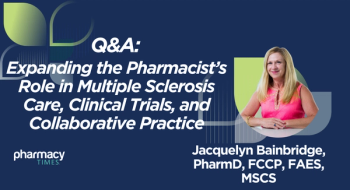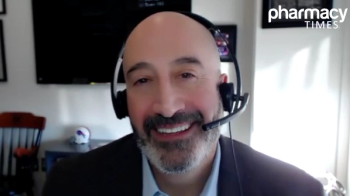Pharmacy Times interviewed Razan El Melik, PharmD, BCACP, assistant program director at Mayo Clinic, on her experience in the pharmacy industry, how she got involved, and what she finds most fulfilling working as a pharmacist. El Melik highlights the satisfaction that she feels when the pharmacy students she mentors receive their first careers in the industry and continue to keep in touch with her. She also describes the significance of the pharmacist’s role in caring for patients.
About the Expert:
Razan El Melik, PharmD, BCACP, is an assistant professor of pharmacy, pharmacogenomics ambulatory care pharmacist, and the assistant program director at Mayo Clinic. She has been involved with Mayo Clinic for 8 years. El Melik also serves as a mentor for pharmaceutical students at the University of Iowa and the University of Minnesota. She has been involved in the pharmaceutical industry for 12 years.
Key Takeaways:
1. Pharmacy Inspiration: Razan El Melik’s interest in pharmacy stemmed from the trips she took to the pharmacy with her grandmother. As a child, she observed the warm and friendly interactions between the pharmacist and her grandmother which left a lasting impression. Her exposure to pharmacy and her love for chemistry when she was older confirmed her aspiration to become a pharmacist.
2. The Evolution of Pharmacy: El Melik notes that in her 12 years as a pharmacist, she has seen significant changes within the profession. She describes the greater emphasis on pharmacy advocacy and the recognition of pharmacists’ contributions to health care. She also discusses the integration of artificial intelligence and technology in the pharmacists’ day-to-day work.
3. Rewards in Pharmacy: El Melik finds fulfillment in every aspect of pharmacy, whether it is assisting patients or collaborating with health care providers. She expresses the satisfaction she has when fostering professional growth as a mentor and guide for pharmaceutical students.
Pharmacy Times: Can you introduce yourself and explain how you got into pharmacy?
Razan El Melik: My name is Razan El Melik and I am a clinical pharmacogenomics pharmacist here at Mayo Clinic. I work in the medication management services. I'm also an assistant professor of pharmacy in the College of Health and Sciences at Mayo Clinic, College of Medicine, and an assistant program director of our pharmacogenomics postgraduate (PGY) to pharmacy residency program.
How I got into pharmacy…when I was around 8 years old, my grandmother would actually bring me along with her when she used to go pick up her medications to the pharmacy. The pharmacist there was consistently warm and friendly to her, and she genuinely cherished those interactions. Around the age of 11, I had the opportunity to gain a deeper understanding of pharmacy as a profession—thanks to my cousin who was in pharmacy school at that time—it was at that point that I really realized my aspiration towards pharmacy, and I thought, “Okay, I do want to become a pharmacist.” I remember clearly around eighth grade when I had chemistry, I just loved it, and I continued to kind of like go towards, “I'm gonna go to pharmacy school.”
When I started college, I worked at Walmart as a pharmacy technician at that time, then when I got into pharmacy school I worked as an intern. After that, I definitely knew that pharmacy was the right career for me. I enjoyed speaking with patients and I also knew that ambulatory care—or working in the outpatient setting—is what would be best for me. I graduated from University of Iowa College of Pharmacy, and I did my PGY-1 at Novant Health in North Carolina. I also got an opportunity to work overseas, but I've been with Mayo Clinic now for almost 8 years.
Pharmacy Times: How have you seen the profession change throughout your career?
El Melik: So, I've been a pharmacist now for about 12 years or so, and it's been great because you can definitely see that there are changes. From pharmacy school until now, I can tell you that something that I've observed—at least from my perspective—there is a huge emphasis on pharmacy advocacy within our professional organizations. It seems like now our younger health care providers appear to have a firm grasp of the profound impact and significance of pharmacists, and also, our clinical training has become more robust thanks to the wide residency specialization selections from a decade ago to what's available now. That being said, I do believe that we still have a lot of work to do, starting from the recognition of a provider, the status of a provider for a pharmacist, the ability to not only build for our services, but also to get reimbursed for it. That being said, I do believe that we are close to achieving that goal, based on the advocacy and everything else that we're doing to be recognized as providers.
The other thing is we need to keep up with the health care development. Specifically, it's crucial to keep up with artificial intelligence and technology. I do believe there is going to be big disruption—probably by 2030—so as pharmacists, we need to be more proactive to understand what's changing. We have a lot of opportunities when it comes to telemedicine innovations in the electronic health record. By being proactive and understanding more about these technologies, we will be able to provide the best care to our patients as well as changing health care landscape.
Pharmacy Times: What is the most rewarding part of pharmacy for you?
El Melik: Pharmacy is rewarding in every aspect. Whether you are assisting patients, working closely with health care providers, helping with the selection of the right medications for the patient or teaching the patients how to take their medications, it's really fulfilling in any kind of category. Personally, I think 1 of the most rewarding aspects for me is mentoring and fostering professional growth. I really enjoy teaching and mentoring learners, students, and residents, and it's been incredibly satisfying to witness the professional development of all of my mentees.
When it comes to mentoring, I mentor students from University of Iowa and students from the University of Minnesota. By mentoring, what I mean is that I follow their journey from starting pharmacy school all the way until they get a job, and I'm there to guide them, provide advice, perhaps help guide them about what do they want to do after pharmacy school. And it's been rewarding because I tend to keep in touch with all of my mentees, and what's also nice is they also keep in touch with me and they continue to reach out if they have any questions.
Pharmacy Times: How are you celebrating American Pharmacists Month?
El Melik: So, our department actually has a dedicated planning committee every year that works to celebrate American Pharmacists Month. Specifically, we focus on Pharmacy Week, which [this year] starts [October 16]. By planning activities, we celebrate pharmacists and pharmacy technicians. So, the celebration basically has a range of activities including getting to know your pharmacist, interviews with pharmacy female leaders to encourage other women and pharmacists to actually seek leadership positions. Also, we do have a virtual 5K run or walk for our pharmacists and pharmacy technicians and the goal is raising funds to make a meaningful donation to a local nonprofit organization.
Now, on a personal note, when [American Pharmacists Month] started, I realized that my family has no idea about what [it] is. So, I told myself, “Okay, we're advocating for what we do, but my own family doesn't even know that we have a dedicated month to celebrate.” So, I actually told them about American Pharmacists Month and why is it significant or important to be a pharmacist. I actually prepared a PowerPoint presentation for my 11- and 8-year-olds to explain to them what pharmacogenomics is and what we do. I must say, the kids’ reactions were priceless, and they made me feel proud of what I do.
Pharmacy Times: What does the value of the pharmacists mean to you? To the industry?
El Melik: …The value of a pharmacist—whether to me personally or to the industry—is significant. I feel like I can't even describe it…because we really fulfill a vital role in numerous facets of patient care and beyond. While many are aware of our direct patient care involvement and interventions, our responsibilities extend beyond that. Not only medication management, but we also are involved in providers’ education, learners’ education, and we're involved in medication safety. Our collaboration with other health care professionals is huge when it comes to patient care. Pharmacists are truly instrumental in ensuring the safe and effective utilization of medications to enhance the patient outcomes, and hence, that's why it's important to keep up with the advancements in technology so we can keep that momentum going as well.
Pharmacy Times: Any final thoughts or points you would like to discuss?
El Melik: Truly, the fulfilment of positively impacting the health and well-being of others is what makes pharmacists truly special. I hope you know that this will be something that will serve as guidance to other pharmacy students, or even high school students or young generations that are thinking about the field of pharmacy. I feel like we've grown a lot from many, many years ago, and I look forward to seeing what we have and what will come in the [upcoming] years in this profession.




























